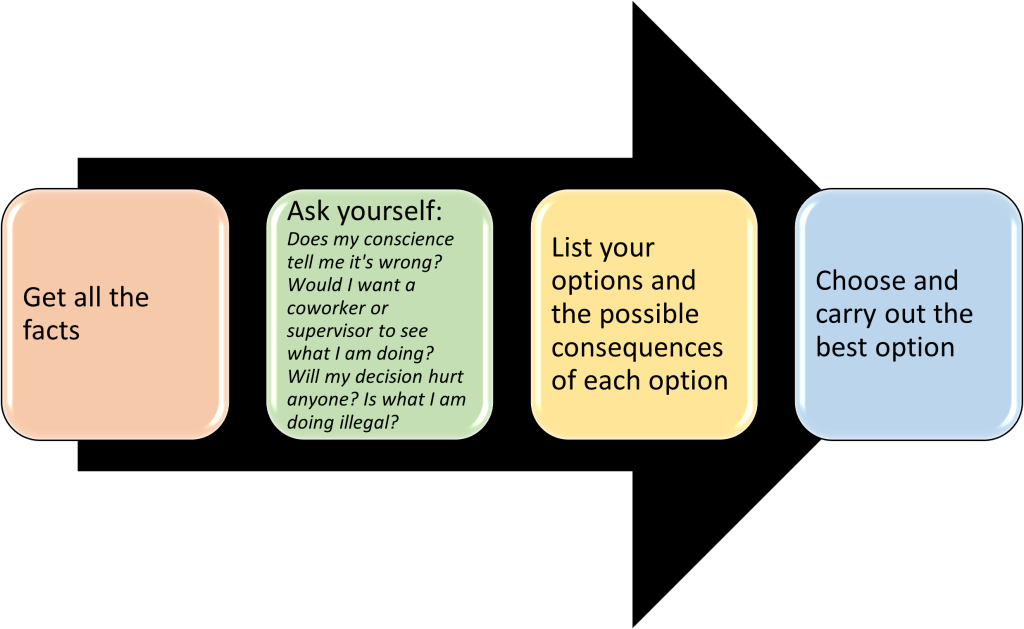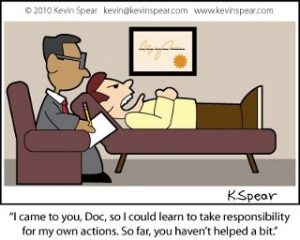2 Responsible and Ethical Conduct
Be a Person with Integrity and Strong Ethics
Ethical Responsibilities in Health Care

- Confidentiality
- Commitment to quality
- Consideration of employer’s and College’s reputation
Why Be Ethical?
As a member of the health care team, you have a responsibility to:
- Your profession: to uphold excellence in all clinical and administrative duties.
- The public: to practice in a competent, responsible, and respectful manner.
- Your employer: to be faithful, accountable, and adhere to the principles of the workplace.
- Your colleagues: to recognize their rights and treat them as you want to be treated.
Why Do Employees Do Unethical Things?
- Lack of integrity
- Job dissatisfaction-employees feel they are overworked or underpaid (they feel they will get their money’s worth one way or another, so they make long-distance calls at work, take home supplies, etc.)
- Financial reward-make a little extra money by padding expenses
- Pressure to meet goals
- May not know or understand the code of conduct
What Types of Unethical Behaviour Exist in the Workplace?
Misuse of technology: Using office computers for personal reasons, using cell phone during work hours.
Abuse of privilege: Misusing the rights and power given to you by your position for personal benefit or at the expense of another person.
Conflict of interest: Situations in which a person’s own interests/desires/needs could influence decisions they have to make in their role as an employee.
Preferential treatment: Treating one person or a certain group of people better than you treat everyone else.
How to Handle an Ethical Dilemma
Figure 1 Four Steps to follow when making an ethical decision at work. Note. [Image Description]
Note. [Image Description]
Follow Through on What You Say
Be a person of your word. If you can be relied on to do what you say you will do, an employer will eventually see you as their go-to person (Mind Tools Content Team, n.d.). When your words match your behaviours, it makes it easier for an employer to trust you, and they will ultimately be more likely to recommend, praise, and invest in you. On the contrary, not actively following through on what you say can paint an employer a negative picture of you; they may assume you are undependable or even uninterested in the job.
Reflection Question
- Do you tend to follow through on your promises in your personal and professional life?

Be Honest and Own Your Mistakes
It’s not the end of the world if you make a mistake on the job, it just makes you human. The worst thing to do is to lie about it. If you take responsibility for your mistakes and avoid making excuses, it will show a great deal of maturity (Half, 2016). Employers will appreciate your honesty and your ability to handle a situation like this. If you show them that you’re willing to learn the proper way to do something and to avoid this happening again in the future, you will be more likely to build a trusting relationship (Piccirilli, 2018).
Reflection Questions
- Are you scared to admit when you make a mistake out of fear that you might get in trouble?
- When an error has occurred, do you make excuses or find a way to shift the blame?
Be Self-Motivated
Just like many workplaces, health and wellness workplaces are busy and employers value employees who can work with little-to-no supervision. This type of person sees what needs to be done and does it. They never sit idle and find ways to keep themselves busy by helping their colleagues or catching up on work that was left undone.
Reflection Questions
- What do you usually do when work is a bit slow?
- Can you find things to do without having to be told?
- When you have questions about your job, do you try to find the answers yourself before running to your supervisor?
Be Visible, Show Initiative, and Offer to Help

Take opportunities to volunteer for upcoming projects or committees. The more visible you are in the work activities you’re taking part in, the more valuable you will be seen to your employer. Likewise, employers appreciate when employees offer to help and recognize when something needs to be done without having to tell them to do it (Half, 2016). Look for opportunities to show your initiative by doing something you think may be helpful for the company, to improve a process, or assist a colleague, and your employer is guaranteed to be impressed.
Reflection Questions
- Do you ever volunteer to be part of different opportunities that come up at work?
- Do you have the confidence to suggest different ways of doing things, in order to increase productivity, accuracy, or efficiency?
Chapter Review
Try this quiz to check your learning.
Chapter References
Mind Tools Content Team. (n.d.). Professionalism meeting the standards that matter. Mind Tools. https://www.mindtools.com/pages/article/professionalism.htm
Piccirilli, G. (2018, January 2). Knowledge center: 10 characteristics of professionalism in the workplace. AAPC. https://www.aapc.com/blog/40477-10-characteristics-of-professionalism-in-the-workplace/
Robert Half (2016, March 4). 30 character traits of mentally strong people. https://www.roberthalf.com/blog/management-tips/30-character-traits-of-mentally-strong-people
Media Attributions
Who Are You by Brett Jordan, 2021. Used under the Unsplash License.
Figure 1. Four Steps to follow when making an ethical decision at work. © Copyright Ellen Dilgert, CC BY-NC-SA 4.0.
Trust by Steven Lasry, 2021. Used under the Unsplash License.
Assisted Self-Help by Kevin Spear, 2010. CC BY-NC-ND.
Lazy Dog by Priscilla Du Preez, 2020. Used under the Unsplash License.
Helping Out by Annie Spratt, 2019. Used under the Unsplash License.
Image Descriptions
Figure 1 This SmartArt graphic indicates four practical steps to follow when faced with an ethical dilemma. The steps are:
- Get all the facts.
- Ask yourself: Does my conscience tell me it’s wrong? Would I want a coworker or supervisor to see what I am doing? Will my decision hurt anyone? Is what I am doing legal?
- List your options and the possible consequences of each option.
- Choose and carry out the best option.



